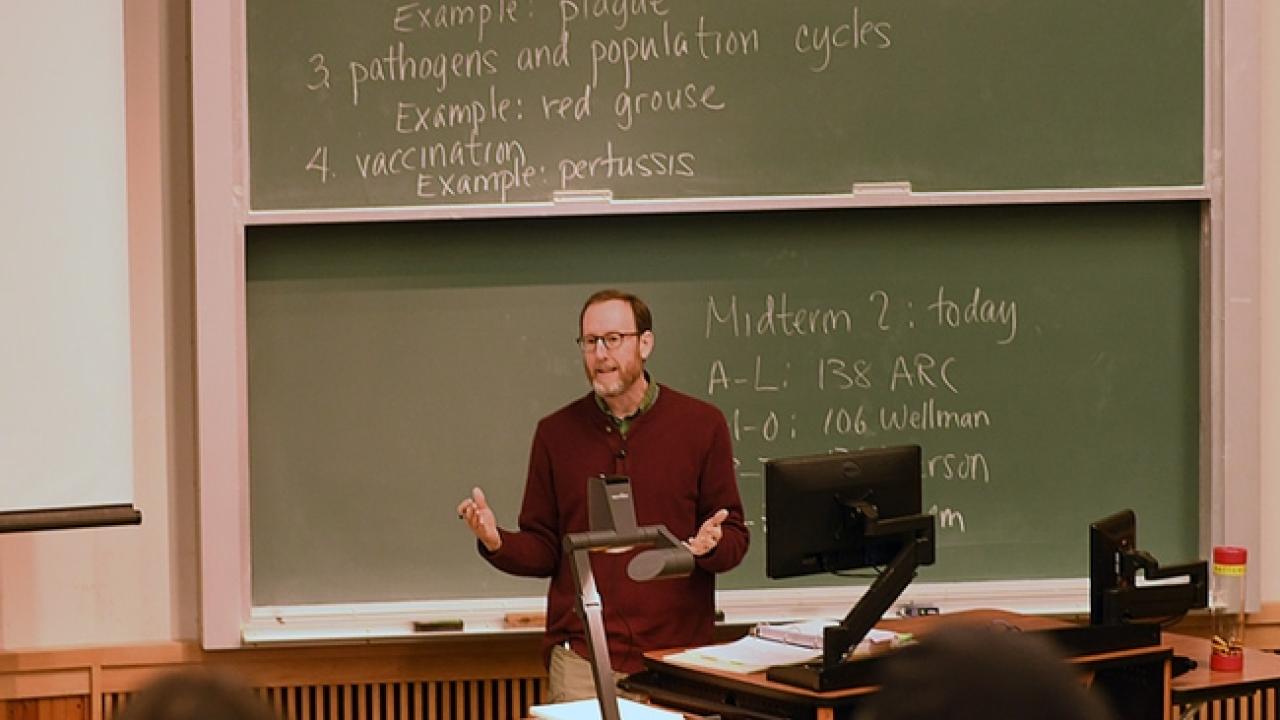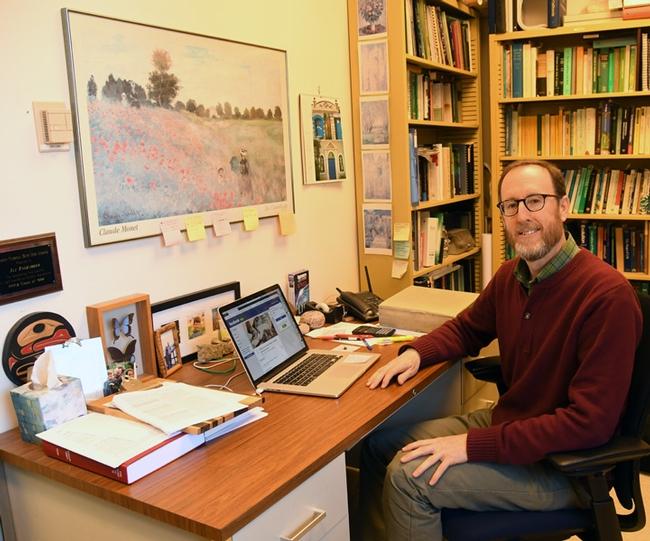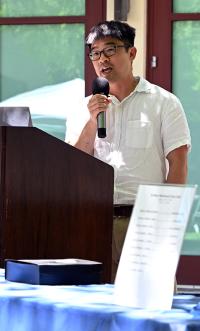
Heartful Thanks to UC Davis Distinguished Professor Jay Rosenheim
Professor Louie Yang Reflects on Rosenheim's Exemplary Career

(Editor's Note: This is the first in a series of articles featuring the seven retiring faculty honored at the UC Davis Department of Entomology and Nematology's Retirement Event on Tuesday, June 11, 2024 at the UC Davis Alumni Center. Their length of service totals 248 years.)
"Jay was an undergrad at UC Davis in the 1980s, before completing his PhD at UC Berkeley in 1987, and starting as a professor in this department in 1990. Upon his retirement this year, he will have been faculty in our department for 34 remarkable years. I've known him for 24 of those years and having seen just a little bit of how much he has done for students, colleagues, and the university in each of those years, it is deeply humbling to reflect upon his cumulative career-long contribution to science and mentorship."
So began Professor Louie Yang, community ecologist, in his tribute to UC Davis Distinguished Professor Jay Rosenheim at the UC Davis Department of Entomology and Nematology's retirement event on June 11 at the UC Davis Alumni Center. Each presenter was allocated five minutes. Joanna Chiu, professor and chair of the department, emceed the event.

"I've come to see that there are many ways to be a professor," Yang continued. "Jay's way has long been characterized by creative scholarly achievements, thoughtful and intentional contributions to agriculture, an intuitive feel for his organisms and a natural intuition for the quantitative side of ecology. I've also had a chance to witness and benefit from Jay's commitment to mentorship up close. Jay has provided mentorship to students and faculty alike, and I've benefited from both. His mentorship is characterized by good judgment and empathy; he is quick to forgive mistakes and genuine in celebrating your successes. On our campus, he's provided leadership of a quiet doing kind, often working behind the scenes to make important things happen and to provide a calming and moderating influence in challenging times."
"I've now come to see that there are lots of ways to retire. Many of our colleagues retire gradually, some almost imperceptibly. And thank goodness that we have more time to spend with them --it is genuinely wonderful to be able to draw upon the wisdom of emeritus faculty on campus. But Jay is following his own path in retirement, one that has been characterized by the same thoughtful, deliberate and certain approach that characterized his time as a professor."
Yang concluded with "I will sorely miss having Jay as a colleague. But I want to end with a heartfelt thanks. Thanks for all you've done for us over the many years, and for passing the baton. We wish you all the best on the road ahead."

Rosenheim, who is retiring in June after 34 years of service, specializes in insect ecology, integrated pest management, and biological control, and the use of farmer-generated data to enhance pest and crop management ('Ecoinformatics'). He is internationally known for his research on the ecology of insect parasitoids and predators, insect reproductive behavior, and the application of big data, or ecoinformatics, methods in agricultural entomology.
He holds a bachelor's degree in entomology (1983) from UC Davis and a doctorate in entomology (1987) from UC Berkeley. He joined the UC Davis faculty in 1990. and become a UC Davis distinguished professor in 2018.
A native of Yorktown, N.Y, young Jay developed an interest in biology while exploring the vernal pools behind his Hudson River Valley home. As an undergraduate at UC Davis, he initially majored in physics. "On a lark" he enrolled in Professor Harry Kaya's Entomology 100 course in 1981. The professor inspired him, the class enthralled him, and insects captivated him.

Rosenheim's career has not only led to his being elected a Fellow of the Entomological Society of America (ESA) and a Fellow of the American Association for the Advancement of Science, but recipient of teaching awards from the Associated Students of UC Davis and the UC Davis Academic Senate; the Distinguished Student Mentoring Award from ESA's Pacific Branch and the campuswide Graduate Program Advising and Mentoring Award.
Rosenheim co-founded and co-directs the campuswide Research Scholars Program in Insect Biology (RSPIB) with Professors Chiu and Yang. The program aims to provide "undergraduates with a closely-mentored research experience in biology," according to the website. "Because insects can be used as model systems to explore virtually any area of biology (population biology; behavior and ecology; biodiversity and evolutionary ecology; agroecology; genetics and molecular biology; biochemistry and physiology; cell biology), faculty in the program can provide research opportunities across the full sweep of biology. The program's goal is to provide academically strong and highly motivated undergraduates with a multi-year research experience that cultivates skills that will prepare them for a career in biological research."
In 2022, when Rosenheim received the Graduate Program Advising and Mentoring Award, Jean-Pierre Delplanque, vice provost and dean of Graduate Studies, praised his "excellent service to your graduate program, as well as your positive impact on graduate students and your colleagues. We thank you for your investment in advising and mentoring graduate students and contribution to their success."
Delplanque singled out a few excerpts from the award packet:
- “He has demonstrated his unparalleled dedication to mentoring students, and ability to cultivate an atmosphere of learning, excitement, and critical thinking in the lab, field, and classroom. He consistently makes time to support his students. Regardless of his current teaching and research demands, Jay will provide feedback, schedule meetings, and maintain his open door policy.”
- “Jay is a remarkably skillful and reassuring mentor with a natural generosity of spirit and a broad view of mentorship. He has deep knowledge in a wide range of subject areas, and also has the wisdom to offer students good advice on all stages of the research process. Jay is especially good at putting students at ease and motivating them to persist through the setbacks of research. I have often seen students go to Jay for advice when they are worried and leave feeling better about the road ahead.”

Humbled and honored to receive the campuswide award, Rosenheim noted that "The job of a professor is quite diverse, and quite rewarding in different ways. Teaching in a classroom provides instant gratification, as you see the light of understanding and excitement shining in students' eyes as they explore and grasp new concepts. Research in the laboratory provides instead delayed gratification, where long periods of hard work--sometimes years--may pass before questions are answered and one feels the satisfaction of pushing forward the margins of scientific understanding."
"But, perhaps the most lasting sense of accomplishment comes from mentoring graduate students," Rosenheim says. Building relationships with graduate students, watching them grow in their skills and confidence and, finally, seeing them establish themselves in their careers, provides the kind of reward that is similar in some ways to the happiness that parents derive from their children. And the relationships never end – they are bonds that last a lifetime. I think the key to effective mentorship is to place the student's welfare at the top of one's priority list. So, drafts of papers should be returned promptly with constructive suggestions, and not allowed to languish in a long queue of manuscripts waiting for reviews--more senior colleagues can wait, if someone needs to wait."
"And, I think effective mentorship also means tailoring the kind of assistance provided to the needs and desires of each student. Mentorship is definitely not a one-size-fits-all kind of undertaking. Some students need a lot of encouragement (actually, almost everyone benefits from positive feedback, because research often produces huge servings of critiques), some students need more assistance, especially at the earliest stages of their research, but some students absolutely chafe under too much input, and instead want total independence. That's fine – it's important to adjust to each student's desires and needs. I think good mentorship also means establishing a laboratory culture of openness and collegiality. Everyone should be happy to come to the lab, learn from each other, and contribute to each other's research progress. Mentorship doesn't just come from the lab PI (principal investigator), but from everyone who makes the lab a community."

Rosenheim was inducted as a fellow of ESA in 2020. "Jay's substantial contributions to basic and applied entomology are world-renowned, and clearly merit his election as a Fellow of the ESA," said Professor Steve Nadler, then department chair.
ESA wrote in a news release: "Rosenheim's work has shown that the structure of insect communities is more complex than the archetypal model of three discretetrophic levels, under which predators eat only herbivores and herbivores eat only plants. Instead, widespread predator-predator interactions (intraguild predation), omnivory, and cannibalism create rich and diverse dynamics that can either enhance or disrupt biological control. Rosenheim has also worked to introduce big data techniques to agricultural entomology. By harnessing the decentralized data gathering efforts of farmers, field scouts, and consultants, large data sets can be created and analyzed to reveal important relationships between pests, natural enemies, and crop performance. Rosenheim's research has also examined how organisms evolve to balance multiple factors that can emerge as limits to reproductive success, and how this shapes insect and plant reproductive traits.”
See PowerPoint Presentation Compiled by Chelsea Hogan for the June 11th retirement event. Honored were five UC Davis Distinguished Professors: James R. Carey (44 years), Richard Karban (42 years), Lynn Kimsey (who retired Feb. 1 with 35 years); Jay Rosenheim (34 years); and Diane Ullman (29 years); Professor emerita Sharon Lawler (who retired in January with 29 years); and Adjunct Professor Robert Kimsey (35 years).
Resources:
- The Rosenheim lab website includes his curriculum vitae and research.
- Newly Inducted ESA Fellow Jay Rosenheim Didn't Set Out to Study Insect Science, Dec. 7, 2020, Entomology and Nematology News
- Research Scholars Program in Insect Biology (RSPIB)
- Feature on RSPIB, UC Davis Communications
- UC Davis Entomologist Jay Rosenheim: How His World Changed in 1981, Bug Squad blog, Dec. 8, 2020
